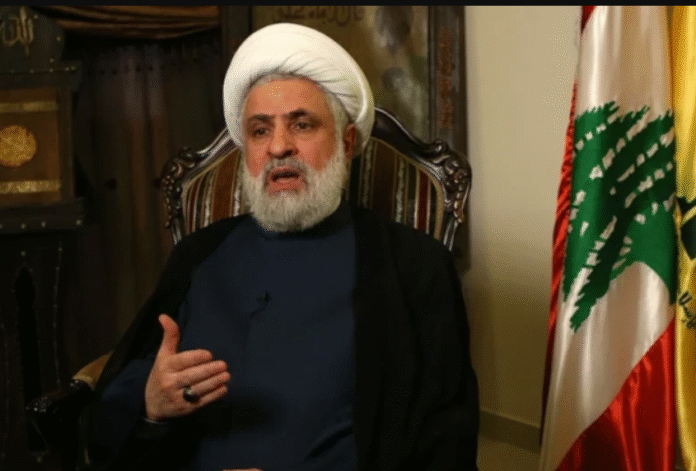Hezbollah Disarmament Plan Lebanon Sparks Fierce Backlash
The Hezbollah disarmament plan Lebanon debate has ignited a political storm, with Hezbollah’s deputy leader Naim Qassem warning the government against what he calls a dangerous surrender to foreign agendas. Speaking in a televised address on August 15, 2025, Qassem vowed the group would never give up its weapons, framing the push for disarmament as a threat to Lebanon’s sovereignty and stability.
A Direct Challenge to Government Policy
Qassem’s speech came after his meeting with Iran’s top security official, Ali Larijani, in Beirut. The timing was no coincidence, Tehran has been a staunch supporter of Hezbollah for decades, and the group’s ties with Iran remain a critical factor in Lebanon’s security dynamics.
The Lebanese government, under heavy U.S. pressure, has tasked the army with preparing a plan to strip Hezbollah of its arsenal by year’s end. The move follows last year’s devastating war with Israel, which left Hezbollah militarily weakened but still politically influential.
Framing Disarmament as a National Betrayal
In his address, Qassem accused Lebanese leaders of “implementing an American-Israeli order” to dismantle the resistance. He warned that such a step could ignite civil unrest:
“The government is handing over the country to an insatiable Israeli aggressor and an American tyrant,” Qassem said, adding that Lebanon would “have no life” if it abandoned the resistance.
He insisted that the group’s weapons are essential for defending Lebanon against “ongoing aggression” and “occupation,” pledging to resist “no matter the cost.”

The Iran Factor in the Disarmament Debate
Iran’s involvement in the Hezbollah disarmament plan Lebanon issue is impossible to ignore. Larijani’s visit came shortly after Iran suffered strategic losses in its own confrontation with Israel, including U.S. strikes on its nuclear facilities. For Tehran, Hezbollah is not just an ally, it’s a frontline defense in its “axis of resistance” across the Middle East.
Unsurprisingly, Iran has voiced strong opposition to the disarmament plan and promised to continue providing Hezbollah with political and logistical support.
Government Pushback and Diplomatic Tensions
Lebanon’s President Joseph Aoun, who also met with Larijani, publicly rejected any foreign interference in domestic affairs. He criticized Iran’s comments on the disarmament initiative as “unconstructive,” signaling Beirut’s determination to control the narrative.
While the government is pushing forward with its plan, it now faces the reality that Hezbollah and its allies most notably the Amal movement hold significant political leverage. Qassem hinted they would avoid street protests “for now,” but left the door open to mass mobilization in the future.
A Risk of Internal Conflict
Analysts warn that the Hezbollah disarmament plan Lebanon could trigger internal instability. The group has historically maintained more advanced weaponry than the Lebanese army, a point critics argue undermines state authority. Yet supporters claim these arms are vital deterrents against Israeli military action.
Qassem cautioned the government that it would “bear responsibility for any internal explosion and any destruction of Lebanon,” portraying disarmament as a direct path to chaos.
Before and After the War
Before last year’s October–November war with Israel, Hezbollah was considered one of the most heavily armed non-state actors in the region arguably better equipped than Lebanon’s national forces. The war took a toll, but the group’s arsenal remains formidable.
Opponents accuse Hezbollah of using its weapons not just for defense, but to exert political influence, sway elections, and secure policy outcomes favorable to its agenda.
Hezbollah’s Red Lines
For Qassem and the movement’s leadership, there is no compromise on the core principle: weapons stay as long as “aggression and occupation” continue. This stance puts Hezbollah in direct collision with U.S. and Israeli interests, as well as with segments of Lebanon’s political elite who argue that lasting peace requires full state control over armed forces.
Regional Implications Beyond Lebanon
If the Hezbollah disarmament plan Lebanon proceeds, it could reshape the balance of power in the Middle East. Israel would see a major security threat diminished, while Iran would lose a key proxy force. U.S. policymakers would likely hail the move as a victory for state sovereignty, but regional analysts caution that removing Hezbollah’s weapons could create a power vacuum filled by unpredictable actors.

What Happens Next
The coming months will be critical. The Lebanese army faces the daunting task of designing a disarmament strategy that avoids civil strife while meeting international expectations. Meanwhile, Hezbollah is signaling that any such effort will be met with fierce resistance, whether politically, socially, or if pushed militarily.
One thing is clear: this is not just a military or security matter, it’s a struggle over Lebanon’s identity, alliances, and future.
Key Takeaways
-
Hezbollah views disarmament as an existential threat
-
Iran strongly opposes the plan and vows continued support
-
Government insists on sovereignty but faces political pushback
-
Potential for unrest and civil conflict remains high
-
Regional consequences could be far-reaching

